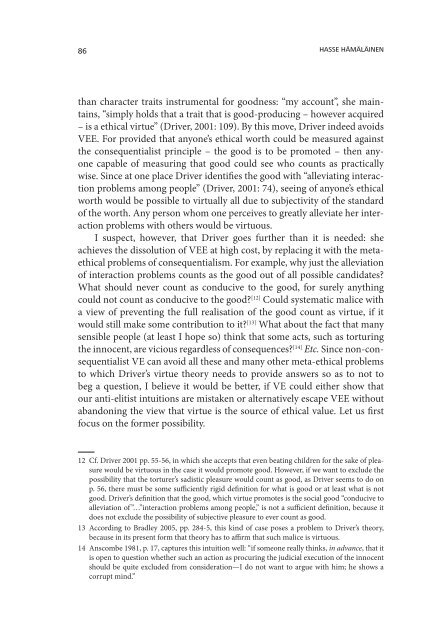Diacritica 25-2_Filosofia.indb - cehum - Universidade do Minho
Diacritica 25-2_Filosofia.indb - cehum - Universidade do Minho
Diacritica 25-2_Filosofia.indb - cehum - Universidade do Minho
You also want an ePaper? Increase the reach of your titles
YUMPU automatically turns print PDFs into web optimized ePapers that Google loves.
86<br />
HASSE HÄMÄLÄINEN<br />
than character traits instrumental for goodness: “my account”, she maintains,<br />
“simply holds that a trait that is good-producing – however acquired<br />
– is a ethical virtue” (Driver, 2001: 109). By this move, Driver indeed avoids<br />
VEE. For provided that anyone’s ethical worth could be measured against<br />
the consequentialist principle – the good is to be promoted – then anyone<br />
capable of measuring that good could see who counts as practically<br />
wise. Since at one place Driver identifi es the good with “alleviating interaction<br />
problems among people” (Driver, 2001: 74), seeing of anyone’s ethical<br />
worth would be possible to virtually all due to subjectivity of the standard<br />
of the worth. Any person whom one perceives to greatly alleviate her interaction<br />
problems with others would be virtuous.<br />
I suspect, however, that Driver goes further than it is needed: she<br />
achieves the dissolution of VEE at high cost, by replacing it with the metaethical<br />
problems of consequentialism. For example, why just the alleviation<br />
of interaction problems counts as the good out of all possible candidates?<br />
What should never count as conducive to the good, for surely anything<br />
could not count as conducive to the good? [12] Could systematic malice with<br />
a view of preventing the full realisation of the good count as virtue, if it<br />
would still make some contribution to it? [13] What about the fact that many<br />
sensible people (at least I hope so) think that some acts, such as torturing<br />
the innocent, are vicious regardless of consequences? [14] Etc. Since non-consequentialist<br />
VE can avoid all these and many other meta-ethical problems<br />
to which Driver’s virtue theory needs to provide answers so as to not to<br />
beg a question, I believe it would be better, if VE could either show that<br />
our anti-elitist intuitions are mistaken or alternatively escape VEE without<br />
aban<strong>do</strong>ning the view that virtue is the source of ethical value. Let us fi rst<br />
focus on the former possibility.<br />
12 Cf. Driver 2001 pp. 55-56, in which she accepts that even beating children for the sake of pleasure<br />
would be virtuous in the case it would promote good. However, if we want to exclude the<br />
possibility that the torturer’s sadistic pleasure would count as good, as Driver seems to <strong>do</strong> on<br />
p. 56, there must be some suffi ciently rigid defi nition for what is good or at least what is not<br />
good. Driver’s defi nition that the good, which virtue promotes is the social good “conducive to<br />
alleviation of ”…”interaction problems among people,” is not a suffi cient defi nition, because it<br />
<strong>do</strong>es not exclude the possibility of subjective pleasure to ever count as good.<br />
13 According to Bradley 2005, pp. 284-5, this kind of case poses a problem to Driver’s theory,<br />
because in its present form that theory has to affi rm that such malice is virtuous.<br />
14 Anscombe 1981, p. 17, captures this intuition well: “if someone really thinks, in advance, that it<br />
is open to question whether such an action as procuring the judicial execution of the innocent<br />
should be quite excluded from consideration—I <strong>do</strong> not want to argue with him; he shows a<br />
corrupt mind.”<br />
<strong>Diacritica</strong> <strong>25</strong>-2_<strong>Filosofia</strong>.<strong>indb</strong> 86 05-01-2012 09:38:22











![Programa [pdf] - cehum - Universidade do Minho](https://img.yumpu.com/17305425/1/190x135/programa-pdf-cehum-universidade-do-minho.jpg?quality=85)




